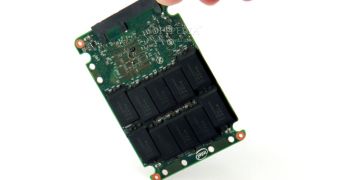Back in early September last year Intel made its foray into the market for Flash-based Solid State Drives, providing the entire world with its new mainstream X18-M and X25-M SSDs. Designed in 1.8-inch and 2.5-inch form factors, these drives were widely recognized by various hardware publications for the increased performance they delivered in comparison with competitive products on the market. However, Intel's mainstream SSDs weren't shipped without flaws, as the fellows over at PC Perspective managed to find out. The problem with the drives' performance, after prolonged use, was quickly covered by the online media, consequently drawing the attention of Intel. On that note, the leading chip maker has just released a new firmware update, specifically designed to fix the reported issue.
The company's new SSD firmware is now available for download and has been designed to deliver support for its X25-M 80GB and 160GB SSDs, as well as the 1.8-inch X18-M 80GB and 160GB drives. According to the release notes, the new firmware should enable the drives to “deliver the best performance in your PC.” In addition, the chip maker continues in the release notes, “this firmware revision has several continuous improvement optimizations intended to provide the best possible user experience with the Intel SSD.”
The problems that were reported by the fellows over at PC Perspective were related to the drive's performance specifications, after being used for a period of time. According to their findings, the average write speeds of the drives were reduced to half, at 40MB/s or even less. Fortunately, the new firmware release addresses that specific issue, enabling the end user to take advantage of the performance of said SSDs even after they have been used for a while. As a matter of fact, according to their updated review of the Intel X25-M SSD, the write speeds of the drive were constant at 80MB/s.
This can only prove that, if you are already using an Intel SSD, you should update to the latest firmware, which is already available at Softpedia.

 14 DAY TRIAL //
14 DAY TRIAL //